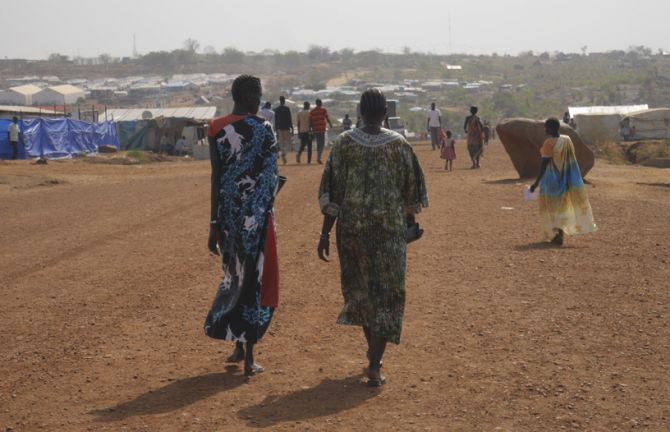

Feature Story
Ensuring access to HIV services for internally displaced people in South Sudan
01 June 2015
01 June 2015 01 June 2015In the north-eastern city of Malakal in South Sudan, an HIV support network with around 150 members met on a regular basis to talk about the challenges they faced in accessing antiretroviral medicines and the food they needed to stay healthy. But in 2013, when the civil war broke out and fighting reached Malakal, everything changed.
Hundreds of people were killed and thousands more fled their homes, many to the camp run by the United Nations Mission in South Sudan (UNMISS) in the outskirts of Malakal. Only six of the members of the network found their way to the camp. Joseph Leggi Pio, who works at the HIV Unit in UNMISS and was one of the founding members of the group, doesn’t know what happened to the rest.
Life isn’t easy for anyone in the camp, but it can be especially difficult for people living with HIV. Medical facilities inside the overcrowded camp are facing logistical problems, including shortages of antiretroviral medicines and food and long waiting times to see health workers. Mr Pio said one of the patients living with HIV at the camp had recently died. Another person managed to move to Juba, where there is better access to HIV treatment services. Many more people living with HIV regularly visit Mr Pio’s office to find out when the medicine will arrive.
More than 100 000 internally displaced people are crammed into 10 UNMISS protection sites throughout the country, none of which were built to shelter anywhere near that number of people.
“Everything is a priority,” said Leku Dominic Samson, Senior Medical Assistant with the International Organization for Migration. “The HIV needs are only starting to be addressed.” Health workers have focused on emergency first aid, while also dealing with widespread diarrhoea and an increasing number of malaria cases.
The Government of South Sudan and health workers are committed to finding ways of providing HIV prevention and treatment services to internally displaced people in the UNMISS sites. Humanitarian organizations and United Nations agencies, including UNMISS, UNAIDS and the Office for the Coordination of Humanitarian Affairs, provided technical and financial support to open an additional primary health-care centre, where HIV testing and counselling services are available.
These organizations are also advocating to install a CD4 machine at the United Nations Hospital in the Malakal camp to help health workers monitor the viral load of people living with HIV. In the meantime, HIV prevention and treatment messages are being disseminated to more than 20 000 people living in the camp.
“Awareness is always an issue in the camp as people continue to arrive from all over the country, including rural areas where access to health information is limited,” said Mr Pio. He added that people’s behaviour in the camps, where they tend to take more risks, is worrisome. He is especially concerned that young people, many of whom were separated from their families during the fighting, are having unprotected sex, at times due to lack of access to condoms.
Mr Pio and other health activists are training groups of HIV counsellors to mobilize people around the camp to talk about HIV and encourage them to protect themselves. The counsellors also take this opportunity to distribute up to eight boxes of condoms a day.
The counsellor trainings and community dialogues are beginning to show positive impact. For example, Tungwar Wuor—a resident at the Malakal camp—said he had little knowledge about HIV before he went through the training session to become a counsellor in March. Now he has red ribbons on all his clothes and talks easily about how people can protect themselves and others from HIV infection. “I wanted to help other people know their HIV status and how to prevent HIV,” said Mr Wuor. “HIV infection is something that can be stopped.”
He added that many people are initially wary when he starts talking to them about the virus, because of the stigma associated with HIV. He said some of them associate HIV with immorality. He has also been working with religious leaders to include HIV prevention messaging in their services.
“I explain to them that it is possible for anyone to contract the virus if they do not protect themselves and that people living with HIV can access treatment to lead positive lives,” said Mr Wuor.



